#tmfu meta
Note
Oh a TMFU/Gorncharov cross over??? Maybe Illya, Napoleon, and Gaby are just in Naples for an unrelated issue. Or Gorncharov knows Illya from childhood and calls his old friend in for help. We all know that Gaby and Katya would get on great. Illya and Gorncharov can both be idiots pining together over Napoleon and Andry respectively. Napoleon and Andry can probably bond over their tastes for finer things in life or something I dunno.
This is of course a very natural crossover! It's no secret that Goncharov is one of Guy Ritchie's favorite movies, and The Man from U.N.C.L.E. definitely shows the great influences of all his movies; he's said before that he wanted to set TMFU in Italy as a nod to Goncharov, and in the original script Victoria's name was Sofia. However, since Goncharov was more or less still lost in 2015, I feel like the parallels are definitely underappreciated, especially all the clock/watch imagery and its ties to both the themes of broken families and Goncharov/Illya's trust issues. Few people realize that Illya's "You know what my mission is?" line when Napoleon returns his father's watch is a direct reference to Goncharov's "You know what the job is?" line in the clocktower scene when he confronts Andrey. Of course the very fact that Illya gets his watch back shows that Illya still holds on to his sense of self, unlike Goncharov, who loses it for good. (Goncharov google doc, short analysis of Goncharov's watch)
Now about that crossover.
I assume we're going on a crossover before the events of the movie, since, well, spoilers (can you spoil a 50 year old movie?), but there's not a lot of opportunity after. Perhaps set in the late 60s, after UNCLE has been a team for a while.
I like the idea that Goncharov knows Illya from his past, before Illya's father was arrested, and before Goncharov was truly inducted into the family business. When Illya's father is arrested and he's sent to an orphanage (common for children of political prisoners), he of course loses touch with everyone from that life, including Goncharov. I think Goncharov, even well-connected as he is, wouldn't know Illya is a KGB agent now, but perhaps Illya does know about Goncharov's move to Naples. He finds out about it during a KGB operation and doesn't really think much of it, but then the UNCLE team ends up in Naples on a mission and whoops, it's connected to Goncharov. This could definitely lead to some angst and conflicted feels since they were good friends as children, but now Goncharov is part of the mob, so they're obviously thrown into this antagonistic relationship. Despite himself, Illya can't help but want to try to find a solution that doesn't end with his old friend dead.
He's surprised to find that his partners support him in this, but of course Andrey and Napoleon hit it off (leading to some scenes of jealous Illya & Gonch; Goncharov gets threatening toward Napoleon because he thinks Napoleon is trying to make a move, only to be shocked that Illya is deadly serious about protecting his American; Illya and Napoleon have an argument about all the time Napoleon is spending with Andrey), and Gaby and Katya would definitely share a certain kinship. I think that seeing Goncharov and Andrey's relationship, fraught with unresolved homoerotic tension, and how destructive repressing those feelings is, would help Napoleon and Illya recognize the cycle in their own relationship and break it, finally admitting what they mean to each other. Perhaps Gaby secretly tries to convince Katya to leave Goncharov and the mob behind, but of course she fails because Katya's not at the breaking point yet, she still believes things can work out.
Obviously there's a ton of potential here for a crossover! And that's not even delving into the hints at Goncharov, Katya, and Andrey's histories with the KGB in canon, which is pretty much unexplored.
#goncharov#tmfu#goncharov 1973#goncharov analysis#the man from u.n.c.l.e.#the man from uncle (2015)#the man from uncle#tmfu meta#(kind of)#guy ritchie#napollya#tmfu aus#headcanons and aus#asks and answers#unreality#yes i went there
56 notes
·
View notes
Note
I saw you reblog the: the hand, the heart, the head for Geralt, Ciri and Yennifer and now I cannot stop thinking about how it would be in case of Gaby+Napoleon+Illya. Gaby is probably a clear candidate for the head but what about Illya and Napoleon?
Hiiii! That’s a good question, and I rambled about it more than I intended to LOOOL sorry <3
First of all, I have seen multiple takes about what the head/heart/hands thing means, like a leadership model (about working because you think you should, because you genuinely feel an affiliation to said work or because you are told to, if I remember correctly), or thinking with your head/heart/hands, or using logic/emotions/action as a means of persuasion.
Usually when I see that meme I think of it more in terms of the head as the more logical and focused one of the trio, the heart as the more emotional one and the hands as the one who is more action oriented.
SO for the trio it’s not really cut and dry, I can see it multiple ways. I agree that Gaby should be the head at the end of the day, I do think she has a temper and a tendency to default to anger/defensiveness when she feels emotional but I don’t see her as a very emotional person, and instead she seems pretty logical and focused. In the movie she really played her role well, even though that was her first mission and it was a complicated one (playing triple agent! Your first time! Like that takes some focus and control), she came across as a pretty logical person to me.
But I also could see Napoleon in the role of the head, because of how he seems to always be running through data and options basing on what he observed, he seems good at being calculating and behaving himself in accordance to the conclusion he came to, I definitely see him as the type to outsmart his way out of situations.
If the head goes to Gaby, though, I’d say Napoleon is the hands, because---okay, for one it’s funny. He’s a thief and he’s good “with his hands” looool. But I also do see him as a pretty action-oriented person, that looks at the practical things that he can do when in a sticky situation, and I feel like when he’s stressed about something and he feels like he’s not in control he’d strive to get that control back by doing something about it.
Illya would also be a candidate for the hands though, especially because it’s the role that is often assigned to the protector of the group, the one that is going to physically fight and be the literal hands (in a brute force way) of the arrangement. But also, I’ve talked about this before, I feel like Illya is a pretty handsy person, like he really goes for casual affectionate touches, so it would track looool.
But I really can’t see Napoleon or Gaby as the heart of the group (because I feel like Gaby deals with her emotions by pushing them away with a baseball bat, while Napoleon sees an emotion, locks it in a closet, throws away the key and goes “WELL never thinking about THAT ever again ahahah” and lives in denial until the closet explodes), so I’d go for Illya as the heart, because he seems to me like the most emotional one out of the three, the one that would be more prone to explictly expressing his feelings (I mean.........to be fair, it’s a low bar) and the one who is more open to letting his partners in and to be in touch with what he’s feeling to begin with. I also tend to see him as the more idealistic one out of the three of them, so.
Yeah this is my take looool thank you for the question <3
#i hope this makes sense my brain is kinda fried loool#gapollya#napollya#gallya#napoleon x gaby#the man from uncle#tmfu#illya x napolen x gaby#not spn#ely replies#my meta#sort of loool#anon
13 notes
·
View notes
Text
been procrastinating on my mfu nanowrimo fic by thinking about napoleon and illya’s dynamic. one thing from the show that the film is missing is how passionate that illya and napoleon are about saving people. on a first watch, one could argue the film glosses over their motives, or at least that their motives are selfish. on further inspection, however, their motivations are perfect for character growth, and compliment each other very well.
illya, for example, is motivated by his need to protect and serve his country, though he has been extremely isolated from his peers. he is great at acknowledging the bigger picture, but lacks empathy for the individual person. joining uncle shifts his ability to care for one country and expands it to encompass the world at large. the world is made up of isolated powers that often (unfortunately) work against each other, but a better world is possible, and he can help make that happen. he learns to see the worth in protecting countries and cultures as a result of his time at uncle. we see a hint of this culminate at the end of the film when he burns the disc to save the world, completely disobeying his handler.
napoleon, on the other hand, is much more individualistic. yes, he joined the military, but it’s clear the war ruined any semblance of patriotism he may have had. his time being chased by every agency under the sun has made him wary of national powers. he definitely starts out the film with a selfish streak, however, napoleon also is a huge flirt, and has an appreciation for art. he has a deep understanding of people, their motivations, and their emotions. it’s not that much of a stretch to think that his skillset would grow into a need to protect the individual. if thrush were to take over a trade city for the political advantage, napoleon is much more concerned about what will happen to the nice waitress at the hotel bar. he may not have high empathy levels at first, but they’re prime for development. we see this culminate when he saves illya from drowning rather than driving away.
i think this is why i love their dynamic, though. napoleon comes across as frivolous, because he is. illya comes across as detached because he is. together, however, they can remind each other what matters. illya can remind napoleon what’s at stake, and napoleon can encourage illya to empathize. they claim they like working alone, because they don’t have to deal with their conscience. they may get in arguments on the job because of their differences, but it makes them the most successful partnership at uncle.
#pepper talks#meta#the man from uncle#the man from u.n.c.l.e#mfu#tmfu#napoleon solo#illya kuryakin#the man from uncle meta#tmfu meta
22 notes
·
View notes
Text
I just realised that Illya’s affinity for cool new gadgets might not only be a representation of Russian inventions but also his much higher inclination to use new and modern stuff than Napoleon who’s traditional in a classy way.
67 notes
·
View notes
Text
So I tried to do some digging into the newspaper clippings to see if there were any dates attached to create a bit of a timeline for Solo (there weren’t any dates, unfortunately) but I did find some other interesting information which lead me to come up with some headcanons.
So, we know Solo joined the army as the occupying force in Europe in 1945 and was 16 years old at the time. He was noted for his disguised service from 1945 to 1958 and within that time rose to the rank of sergeant. During this time he discovered the vast profits to be made selling art on the blackmarket.
Now after his service, he lived in England for a time and snuck his way into European high society. Perhaps while attending a gala at Duncombe Park in Yorkshire, he sees an exquisite Rambrandt he must possess. While he’s casing the place, he notices someone in attendance who doesn’t belong, who doesn’t belong in this high society extravaganza like himself—and this beautiful woman is casing the place for the Rambrandt as well! Evidently they team up for most of the newspaper clipping say “thieves”.
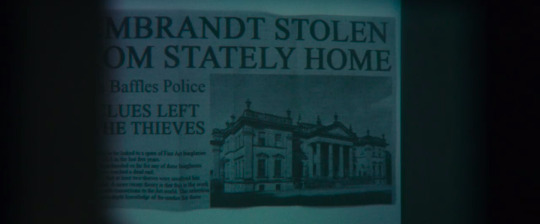
For 6 years they work together on a burglary spree that baffles police because they leave no evidence behind.
They steal a Rodin sculpture of “incalculable value” from a bank vault in Florence, Italy. In the newspaper (which I roughly understand—I’m not fluent in Spanish), it mentions how the manufacturer considered the vault “impregnable to thieves” due to it’s complex closing system. Police believe that the thieves broke into the bank at midnight after some of the guards changed over from patrolling the building.

They go on to steal more paintings:

(I found the painting on a stock website!)
And a pearl necklace is stolen from a bank lockbox:
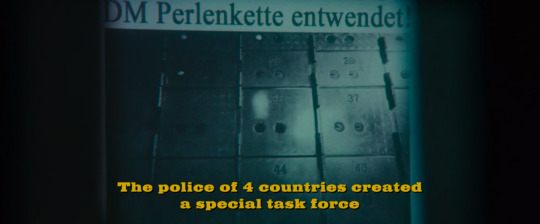
I wonder if Solo gave the necklace to his partner in crime?

Because of these “prolific thieves”, a special task force of police from 4 different countries is created to catch them. For 6 years Solo isn’t caught. Then on June 11th, 1958, Solo’s mistress betrays him to the CIA. He is arrested and incarcerated in Rochester, New York.
The judge in his case likely took into consideration his service in the military, and with the CIA arguing that his talents would be wasted in prison, his 15 year sentence was suspended in exchange for a plea bargain of some sort and that he would work for the CIA the rest of his remaining 10 year sentence.
I feel like his sentence would have been reduce even further if he had given up the art and antiquities stolen, but his mistress probably still had them or sold them on the black market.
So Solo has worked for the CIA from 1958-ish to 1963. During this time period, he has still been “wetting his beak” in illicit activity, but the CIA is turning a blind eye because he is their best agent. As long as he behaves and does as he’s told, he can acquire money to buy truffles however he likes.
#tmfu#character analysis#I wonder if he ever saw his mistress again?#I wonder if she only betrayed him because he was with another woman or if there was some other reason????#mcwrites#mcoriginalpost#napoleon solo#the man from uncle#man from uncle#meta#timeline#character study#news paper clippings#i REALLY need to work on my Spanish#I wonder what the task force was called.... I hope it was something lame like#the Solo Affair?#Mission Solo?#Solely Solo?#reposting for my own connivence
81 notes
·
View notes
Text
I was wondering, since I actually need this for a fanfiction I'm writing, how many years Napoleon has worked for the CIA and how many are left until he is free?
In the credits, we have a shot of the photo when he's been arrested where we can read that this happens on the 11th of June 1958

Then in this we read that he's been sentenced to 15 years.
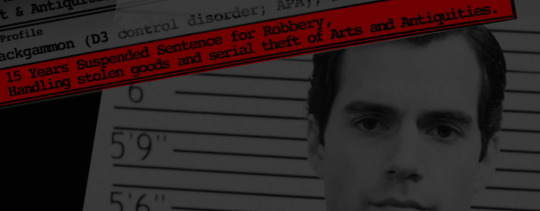
The movie is set in 1963, so only five years since 1958. But then, in the hotel room after Solo got Gaby over the wall, Sanders says that Napoleon still owns him another five years and not ten.
So, my question is: it is possible that, like part of the deal that Solo took with the CIA, his sentence was reduced? It seem a bit strange since Solo wasn't exactly in the position for bargaining, but then, it may also be possible that he got his sentence reduced in exchange of giving up some of the money and/or the arts that he stole (even if I think he still has a lot of these that the CIA doesn't even know about).
So, I was just wondering about this... maybe it was simple a mistake by the producers (or mine, with the calculations and all), but yeah, still wondering. I'm obsessing over this movie way too much xD
#the man from uncle#tmfu#napoleon solo#random thoughts#meta?#I don't know#can this still be considered as meta?#I'm gonna tag it like a meta any way#meta#tmfu:meta#my meta
58 notes
·
View notes
Text
I just watched the last dossier scenes from The Man From Uncle, frame to frame, and I stumbled upon this tidbit of something that piked my interest.


See what I see there?
Napoleon was born March 9, 1929 (happy birthday, my boy). 10 minutes into the film we know (due to Oleg’s despatch to Illya) that, and I quote “He joined the army aged 18 and was posted to Europe”.
Now either the KGB got the wrong intel, or they got lazy with the dossier. Napoleon’s military history states that he joined the army in 1945, which should mean that he was actually 16 at the time.
If we exclude the possibility of oversight, this could lead to some interesting conclusions. Napoleon is shady enough that I can see him lying about his age and forging paper on it.
#the man from uncle#Napoleon Solo#meta#tagging it as#napollya#because that's my otp and i think y'all should see this#tmfu#tmfu meta
886 notes
·
View notes
Text
200 Followers!
Our second milestone guys! This is officially a Big Deal. Welcome to the dumpster fire, everyone. Please join me in yelling into the void.

I’m not always active with original content, but there’s plenty of meta, literary inspiration and trashy headcanons in the queue.
I’d love to hear from more of you! My ask is always open, and feel free to @ me if you ever want someone to go 0-100 real fast with you about your latest character obsession.
Please let know if you want more of something. Not seen some Hill House or Hannibal love in a while? Want some book or fic recs? Drop an ask and I’ll see what I can do. (Shh I know half of you are here for TUA, but I’m branching out, I swear. Some of you are here for the other things.. right? Right.)
And most importantly, thank you! I’m so happy you’re here.
#i'm fuelled entirely on dopamine. every like reblog and comment seriously makes my day#second milestone#200 followers#nikkiwrites#blog maintenance#followers#milestone#personal#tua#hannibal#thohh#tmfu#the witcher#mcu#avengers#headcanons#meta#analysis#movie analysis#tv analysis#book analysis
2 notes
·
View notes
Text
TMFU, Gaby’s fashion, and some feminist film analysis
Back when I slapped together a reblog post about the men’s fashion in The Man From UNCLE in between physio appointments, which somehow got like way more notes than I ever really expected or even wanted, I didn’t address the fashion of the lead female character, Gaby. It was outside the scope of the OP, and I didn’t feel like I had anything new or interesting to say about Gaby’s fashion, or lack thereof.

(My beta says those earrings are the ugliest thing ever. I disagree. It’s a wonder we’re still friends)
Anyways, we see only one brief scene of Gaby in her own street clothes, and a slightly longer sequence of her in her work clothes. The rest of the film, she is wearing clothes chosen for her by Illya. Saying “we just don’t have enough info” is a perfectly reasonable approach to this. So this was the other reason I had no intention of making this post.

But then people started getting interested. Someone reblogged commenting about Gaby’s fashion, and I discovered that I have very strong opinions about something I’d previously claimed was unknowable, and it made me wonder what was going on in my brain.
Then I talked to some other TMFU friends who all seemed interested in what I assumed was common knowledge/nothing unique. So, they may have been feigning interest out of politeness, but it activated the art history side of my brain, and here we are now!
The boring stuff but please read this
I am not attempting to tell anyone how to interpret this film. I am not even trying to change people’s minds or persuade them to my thinking. All I am doing is sharing my thought process. I wasn’t even going to do this for Gaby until people asked. To this end, please don’t attempt to argue with me about this. I don’t want to argue. I won’t respond to it. If you disagree, then please, just move along.
And I’m going to remind people that I love TMFU. I love this movie so much it hurts. Why am I putting this reminder here? Because I am about to apply some critical analysis to it, and in places this will be cynical, and it will not always look kindly on the film. If you just want to exist in a happy “I love TMFU!” bubble and not hear anything less than 100% positive about the film (which is a totally valid choice, I don’t fault anyone for that), then don’t read. But don’t yell at me for being mean or criticizing the film, because I warned you.
Tldr; or, if I were still being graded for this stuff here’s my thesis statement
When analysing Gaby’s fashion, there exist considerations which don’t apply to the male characters. Namely, she is a woman and the male gaze is a thing. So I am very, very wary about taking at face value any expressions of traditional femininity in the choices made for her outfits, hair, makeup, etc. Therefore, when considering her character, I find it much more useful and informative to give more weight to the aspects of her appearance which do not connote traditional femininity, rather than those that do.
For readers who have studied enough media analysis to follow my thought based on that alone, there’s the thesis statement, y’all can go home (or at least skip to the end where I come to a conclusion). If you’re lost, then read on.
(mobile readers, the cut here might not work, and if so I apologize for what is going to be a very long post. Tumblr’s “keep reading” functionality is inconsistent at best, but I tried)
Context is for kings essential for analysing media in a meaningful way
(Or, some brief background. Stick with me here, we’ll get to the good stuff soon)
So, art doesn’t exist in a vacuum. Attempting to analyze any artwork (in this case a film) while disregarding the culture it was created in and the intentions of the creator is...not going to get you very far. Asking “what is art” is a question that quite frankly exhausts me at this point (looking at you, Duchamp) but the closest I’ve ever come to an answer is that the only thing that separates art from everything else is intent. And intention only exists within cultural context. So yes, intent and context don’t just matter peripherally, they are one of the biggest considerations one needs to make when analyzing works of art. The creator in this case being Guy Ritchie et al, the culture being British/American Popular Cinema in The Year of Somebody’s Lord Two-Thousand-And-Fifteen.
Everyone views and creates (if applicable) art through their own distorted, murky, imperfect lens of personal experience. And one of the most persistent Things in western art is that cishet men create art based on their experience of Being A Dude. This is crucial, because this lens of cishet male perspective literally underpins almost all of western culture including popular culture. And thanks to feminist film theorist Laura Mulvey, we have a name for this.
The male gaze and you
I’m going to quote Wikipedia here, because honestly this intro sentence sums things up rather neatly (with one exception which I will address momentarily).
In feminist theory, the male gaze is the act of depicting women and the world, in the visual arts and literature, from a masculine, heterosexual perspective that presents and represents women as sexual objects for the pleasure of the male viewer.
What does that all mean? That the Viewer and the Artist are both cishet men by default, and any women are Subjects of art. Women are viewed, never viewers. Men take action, women are subjected to actions. Furthermore, women are supposed to be pleasurable to view. By men. Since the Viewer is male by default.
But I would disagree that the pleasure is inherently based on women being sexual objects. That’s honestly a really damn limited read on the whole theory, and it’s one that Wikipedia itself contradicts later in the article. More broadly, cis men also derive other forms of pleasure from the presentation and viewing of female bodies, including aesthetic pleasure (the enjoyment of looking at beautiful things).
The theory of the male gaze is not without limits. As originally theorized, afaik it’s not particularly intersectional. It doesn’t really address queer perspectives or perspectives of POC. However, these issues are something I just can’t address here, unfortunately. And when looking at popular media, I still find the concept of the male gaze, imperfect as it may be, is a helpful means of analysis, so it’s worth having in your toolbox.
Circling back, the easiest way to sum up the male gaze, if you’re still not super clear on what it is, is with a demonstration.
Ever seen a shot like this in a movie?

And did you immediately roll your eyes? Feel gross? Congrats, you have just perceived and reacted to the male gaze.
Now we actually get back to TMFU
But the male gaze also shows up in many more subtle, insidious ways than fanservice-y boob shots. For this post, let’s focus on the following considerations, which might help everyone follow my thought process more clearly.
Gaby is a woman
She functions as the love interest of Illya in the script (I am not talking from a shipping perspective. What you ship does not matter for this discussion. I am talking about the narrative function of Gaby in the script as written. Put on your “cishet man” goggles for a moment)
Illya is a man who is attracted to women, specifically Gaby (again, I don’t care if your shipping conflicts with this. I am analyzing the film based on a literal reading of it as if I were a cishet man. Why? Because that’s who made the film. That’s who it’s “for”. I am all for queer readings of film--hell, I ship OT3, I myself have chosen a queer reading for how I interact with it, but I’m not critiquing people’s readings, I’m critiquing the film itself and to do that I have to critique its intentions and cultural context.)
Cishet men are traditionally only allowed to be attracted to women who are conventionally attractive. If they were to be attracted to anyone else it would destroy their fragile senses of self and their heads would explode or something. At least I assume that’s what must happen, based on how terrified they are of it.
Therefore, Gaby must be conventionally attractive, because it is literally required of her or otherwise the whole underpinning of western straight malehood crumbles and then where would we get such a pure, vast source of unadulterated toxic masculinity?

(Yes, this is a very cynical read on things. I’ve studied, like, three centuries worth of this bullshit. I’m tired. Let me be cynical.)
Or, to force myself to be less cynical, Gaby has to be pretty because...nope, this is still going to turn out just as cynical.
But what I will say in favour of this movie is that it gives Gaby and Victoria both a lot of agency and general awesomeness, which is quite unusual in this sort of big-budget action film, and it’s one of the big reasons I love it. I’m not saying that the entire film is sexist. On the contrary, there’s a ton of stuff to celebrate about how it portrays its female characters. But these aspects don’t change the cultural context, and we still have to consider the impacts of the male gaze.
Anyways, point being is that as filtered through the male gaze, Gaby is never given the option to, say, wear no makeup (or the appearance of such, as the guys are afforded, this being cinema where “no makeup” still means makeup) because that would look “ugly”. Instead she needs to have a “baseline of pretty” which is way higher than reality because she is not a real human being with her own agency, she is a character created by a cis male writer/director team in a film directed by a cis man in a genre that caters to cishet men.
Gaby doesn’t exist in a vacuum. She exists battling centuries and centuries worth of sexist convention.
Now then, remembering all of that, let’s actually look at her. There are woefully few good pictures so I’m going to have to piece things together a little. Starting with the coveralls.
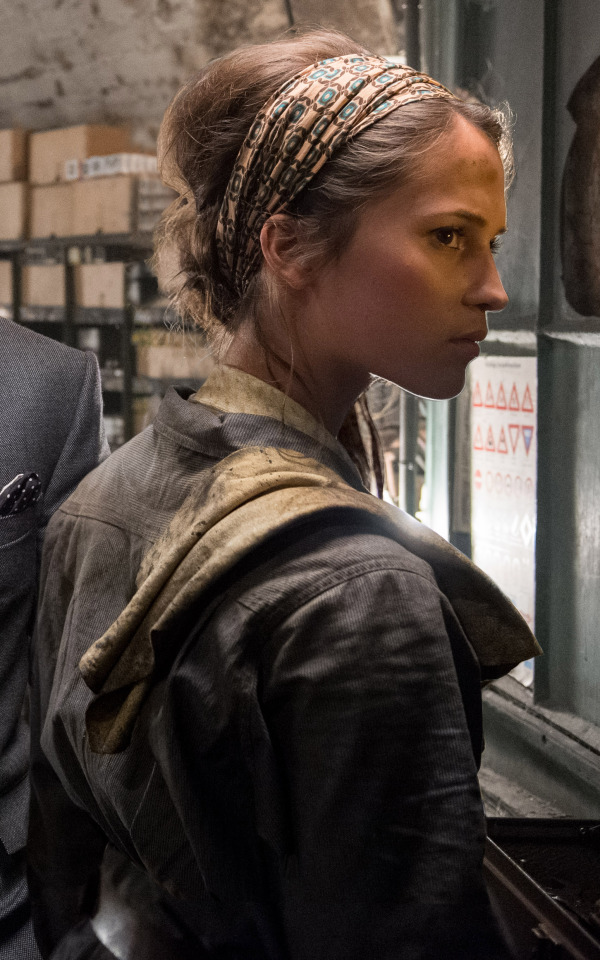
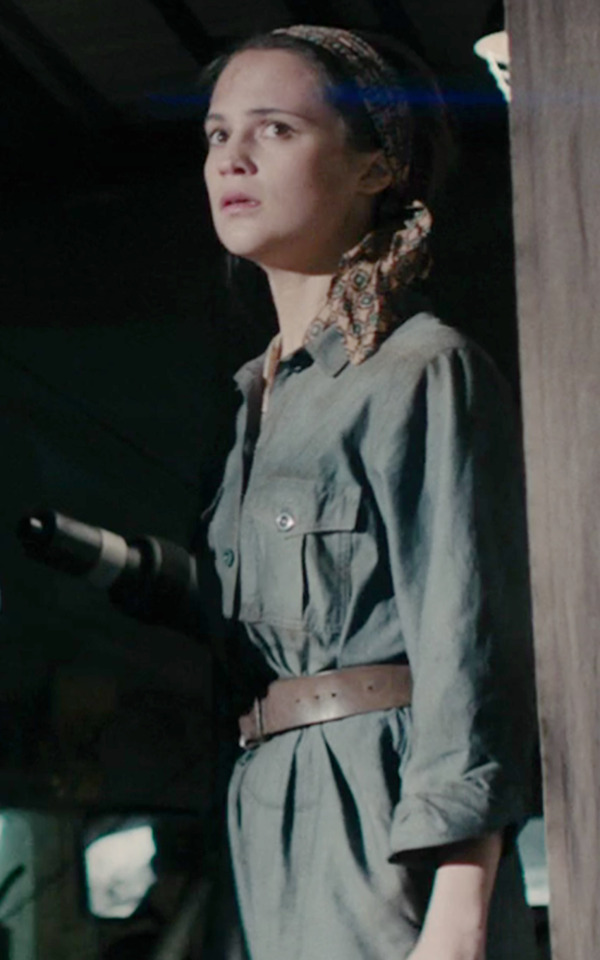
This is a great look, I love it. And I’m going to give Ritchie a lot of credit here because it would’ve been easy to go for a “Michelle Rodriguez in F&F sexy mechanic lady” look. In case I need to provide a visual:

(Repeat above gif about rolling my eyes)
Now, to be clear, I am not making any judgement about the way any real-life women dress. I’m sure there’s plenty of female mechanics who have their hair down and wear tank tops while working. That doesn’t bother me. I don’t care if real life mechanics choose to do their jobs in a string bikini. Or in cosplay of the bee from Bee Movie. I don’t care (and quite frankly it’s none of my business) because they are real people who can make their own decisions. But what I am talking about here is a fictional character who does not have her own agency. I am critiquing how male creators choose to dress their female characters.
So I personally choose to read much more into the unpretty aspects of Gaby’s outfit, because these are not the “obvious” or “easy” things. Obvious and easy are “of course she wears makeup” and “of course her hair looks good” and “of course she doesn’t look like a swamp witch who bathes in mud and spends her days cursing passing men”. Those things don’t challenge or disrupt the assumption that women must look attractive for male consumption.
Gaby’s introduction to us is with her in a pair of grease-stained, baggy coveralls, not wearing any obvious makeup (again, this is cinema, so she is wearing makeup. For cinema the goal posts around “wearing makeup” always need to be moved from where they’d be irl). There’s very little here that screams ‘pretty’. And that is fascinating to me.
I don’t know how deeply Ritchie thought this through when giving final approval to the costume, hair and makeup. But unpretty is not the default here. It’s a choice
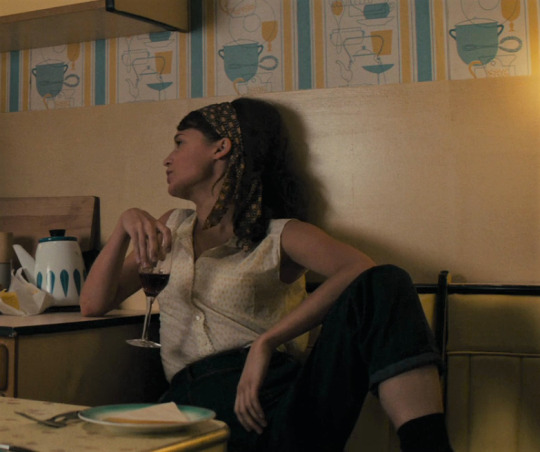
And look at this. This is the stance and dress sense (and socks!) of a woman who does not give a damn about looking good for the male gaze, whether the in-movie gaze of Napoleon, or the implied gaze of the viewer and creator. It’s not ‘pretty’. And this is the only time in the film we see Gaby in her own everyday clothes, as she only escapes East Berlin with the literal clothes on her back.
So how do I think Gaby dresses? I think that for the most part she dresses....like this. Practical. Comfortable. With a few simple touches of things she likes/finds pretty, perhaps, but not with a specific interest in being pretty. She dresses for herself, not for others. And if that isn’t something to aspire to, I don’t know what is.
#gaby teller#tmfu#the man from uncle#meta#costume design#male gaze#fashion#thank you to michael bay for providing me with such a good example of the male gaze
74 notes
·
View notes
Text
Lol that feel when you get distracted from the meta/headcannon your writing to write a fic on the same thing.

#Part 2 to my always a girl napoleon meta should be up later today#and if I play my cards right#the fic im writing should be up shortly after that.#you know#about Ilya having to pretend to cheat on his fiance so that his and#napoleons covers don't get broken#set in TMFU move cannon.#Victoria is going to get a bit of an eye ful when she breaks into#napoleon's room alright.#lessons in intelligence gathering
1 note
·
View note
Text
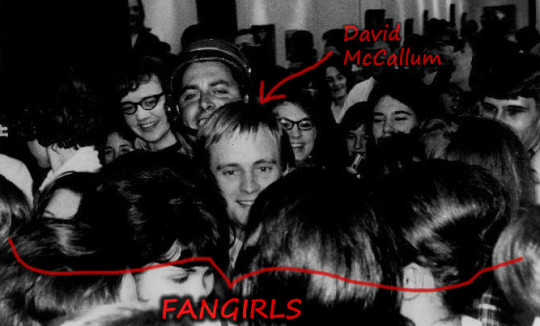
Fig 1: David McCallum’s fanbase on a quiet day, which you can tell because the police have not yet had to shut down the building and smuggle what’s left of him out through a bathroom window.
What still gets me about the 2015 Man from UNCLE movie is that Illya was unquestionably the show's break-out star back in the 60's. He was short in stature, but fast and agile -- an intellectual conceived in deliberate contrast with the brawny heroes of the day. He had a cuttingly dry wit that he never hesitated to turn on his superiors once their backs were turned, though he also had a secret playful streak. He didn't care whether he got the girl, because he knew perfectly well he had nothing to prove to anyone. You could've moored an ocean liner against the inner rock that was his self-image (perhaps the only thing deeper was the trust between him and Napoleon, nevermind that they had nothing in common on paper).
And his fans adored him for it. They loved his refreshing lack of masculine posturing and his tantalisingly mysterious background. They inundated the studio with letters when he was shoehorned into romances they didn't approve of, and mobbed his actor at public appearances. You could've used him to illustrate a dictionary definition of the word "cool" back in the day, and you don't have to look far for evidence that his appeal still draws in fans today, even after more than 50 years of changing times. There's hardly ever been another character quite like him.
And when the producers of the new film were deciding how to rework the concept for a modern audience, they looked at Illya, and everything that had ever been written about Illya's character, and said to themselves:
"Okay, but, what if...
...I mean, what if...
...we changed...
...literally all of that."
I don't think there's a table-flip emoji anywhere on the Internet extreme enough to cover how I feel about that decision.
(Side note: No offense whatsoever meant to new!Illya’s fans -- he's got his appeal, and would’ve been fine as an original character. It's the context -- the staggering arrogance it took to ignore everything that made the original such an icon -- that really gets my goat.)
109 notes
·
View notes
Note
20 for the writing meme, please!
Thanks for asking! You picked a doozy, lol. (Ask me questions about my writing)
20. Tell us the meta about your writing that you really want to ramble to people about (symbolism you’ve included, character or relationship development that you love, hidden references, callbacks or clues for future scenes?)
All right, here's some meta for chapter 2 of Nova, Baby (why chapter 2? Because it's an entire 5+1 inside a single chapter of a multichap fic, which is meta enough reason to choose it).
So yeah, it's a 5+1! I thought this was very clever, lol. Also a little bonkers, but there you go. I love this chapter because it really is a huge arc in Alex and Henry's relationship development, plus I got to play with these little encapsulated moments, and some other characters got to come in too (Nora, Pez). I'll give you some "behind the story" and lists of references for each section!
Below will be spoilers for the entire fic, so be forewarned.
I. My excuse for food-as-a-metaphor-for-love. I love that canonically Alex is a good cook, and this was my excuse to have them indulge when normally you might not get much of that in spy fiction (although, this is also a bit of a reference to my other fandom, The Man from UNCLE, where one of the spies is also a good cook; fancy dishes at safehouses is kind of my jam). I chose molé as a dish because making a traditional one has so many ingredients, to really drive home Alex putting a lot of effort into his relationship with Henry.
II. I had such fun writing this one so that, even though it's from Alex's POV, the reader doesn't know he's wearing a vest until Henry does. He might not have been risking his life (much), but he was definitely risking some broken ribs. This one has a bunch of little references in it, mostly to other spy media:
jumping through a fifth story window into a swimming pool—this is a Burn Notice reference. Throw a mattress into the pool first. Also I just love the idea of Alex being a little Extra when it comes to being a spy.
three guys who look like they walked off a Guy Ritchie set—TMFU is a Guy Ritchie movie, plus I love his movies in general.
Alex hadn’t gotten any confirmation from Langley that MI6 would be a part of this op, Henry had just shown up and Alex hadn’t really questioned it—Meant to sow a tiny thread of doubt in Alex's mind, which would pay off later when the fake burn file comes through.
he notices the way Henry’s eyelashes are wet and clumping together and his eyes are rimmed in red—Henry fucking lost it here. See also the part where he kills the men rather than his usual incapacitating, nonlethal shots. This is probably the point where he realizes how deep he's in.
Turns out, they don’t argue about what to do with it. They destroy the hard drive—direct TMFU reference, (spoilers for that movie), this is what Illya and Napoleon do at the end with the missile plans.
III. The classic Nora-and-Alex-have-a-conversation-about-his-bisexuality scene. Also I just loved the idea of Alex being so oblivious to his bisexuality that he's actually sucked cock before and written it off because 'that's just what spies do'. The layout of desks/offices in this fic roughly comes from the show Covert Affairs, since it's one of the few I've watched that actually regularly shows CIA interiors.
IV. Behind the story peek: Henry bails on this mission because he's concerned, after Lisbon, that he's getting in too deep. Also this scene Alex being a Henry-sexual (not interested in going home with any other people in the bar but can't figure out why), which I love. Also Pez in a poncho, because he would. Pez and Alex have an absolute blast on their mission, and Pez gives Henry no end of shit about Alex when he gets back.
V. Tender wound-tending my beloved. This was such a moment of honesty for them. I mean, not completely honest, but I think this is the first time Alex really realizes just how much Henry cares about him (save the full romantic feelings). There is, of course, a massive callback to this scene near the end of the fic where Alex tells Henry that he can't die because promised he'd always take care of him. All that time, he's carried that in his memory. So yeah, this is a pivotal moment.
+1. Ah, the kiss moment. I always love a kiss-as-a-cover trope, and it made for a good first kiss in this one where it would be easier to write off the potential for feelings, since it was all for the mission. Lots of canon references in this one:
in another life, he would have made a great politician—obvious reference is obvious.
I suppose I could, I don’t know, fall into the dessert table or something—a refence to Cakegate of course.
Christ, you’re thick sometimes—I changed the quote because I wanted it to be a bit less severe than "as thick as it gets." Alex is only thick sometimes in this universe, lol.
Henry’s back hits the wall next to some kind of small, indoor tree—always kissing under a tree, these two.
public displays of affection can be strategically useful for diverting scrutiny away from yourself—yes, this a CA: TWS reference
ALL RIGHT, that's probably enough lmaooooo. You asked me to ramble and I rambled. I hope this was interesting to at least one person.
19 notes
·
View notes
Photo


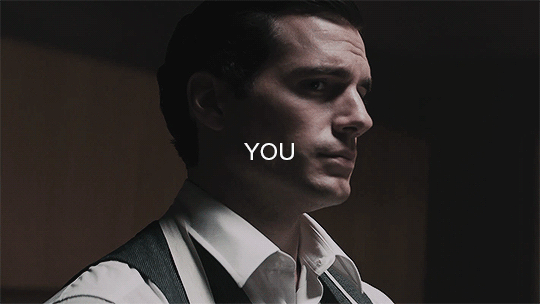


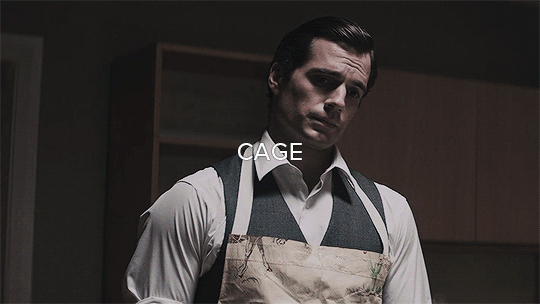
— J.R.R. Tolkien
What I wanted to point out with this set is how scared Napoleon looks around Sanders. The things that gave me this impression were:
the way his jaw clenches
how he licks his lips
he isn’t able to meet Sanders’ eyes
him watching Sanders very closely as soon as he approaches
his smile at the end seems rather forced, as if he’s trying to act confident
After discussing matters with @screamingarrows, she pointed out a few interesting things on her own. I’m gonna quote her (more or less) directly now, because I can’t put it into better words:
“Even the way he’s postured. He keeps his back to the wall when he’s standing in the doorway so no one can sneak up on him. I have no doubt Sanders had had him beat. The camera implies that when it angles to the two agents standing by the door and window.”
#tmfuedit#tmfu#napoleon solo#uncleagency#the man from uncle#*mine#*gif#*tmfu#meta#i'd love to hear your thoughts on this#so please#feel free to add your opinion
511 notes
·
View notes
Text
"Enemy" in The Man from U.N.C.L.E.
(Please excuse the poor grammar and wording in this post–my poor brain is still recovering).
Alright, I think I’ve praised the portrayal of Russians in The Man from U.N.C.L.E., but I also have to say how much I appreciate how they handled Gaby as a German. Consider this; her uncle tortured people in concentration camps and her father was “Hitler’s favorite rocket scientist,” and yet Gaby’s nationality as a German has NO ASSOCIATION with the Nazis. That kind of differentiation is unprecedented in Hollywood, which almost always lumps “German" and "Nazi” as though there was no difference.
This is an extremely important message considering the fact that this “the enemy of America = evil” propaganda, designed to ease American public opinion of killing people they’d never met who had never done them any wrong, is outdated by 80 years. And this kind of black-and-white, us-vs-them “thought programming” pervades American culture to this day, making people unwilling to try to understand one another, which more often than not, leads to mindless violence.
Once again, The Man from U.N.C.L.E., a silly summer blockbuster, has more sophisticated and nuanced views of the morality and humanity our previous enemies than about 99% of “serious” Hollywood films. And it went completely unnoticed.
That’s one of the things that frankly disappoints me the most, the fact that fandom largely misses or chooses to ignore the most basic message of the film: our enemies are human, we can work with people we’d kill without a second thought (Gaby is most definitely friends with veterans of the war and would have been herself if she had been male), people we have written off as just another cog in an evil monolith CAN have the greater good of mankind in mind. Just watch how Illya goes from a sinister figure in the darkness, a monstrous and nameless enemy, to becoming the most sympathetic and human character in the movie.
Regarding the final scene, Napoleon burning the disk is expected–the American hero always does what’s right, right? But here we ALSO have the Russian, a “bad guy,” choosing the good of all people over the interests of his own country as well (I’d argue that Napoleon has little love for the country of his birth as a direct juxtaposition to Illya’s intense patriotism but that’s another topic entirely). It’s a subtle but powerful message considering the fact that other American movies featuring Russian protagonists have flopped simply because audiences couldn’t accept Russians as “heroes.”
Now, I might be treading on thin ice with this following idea, but I’m in a risk-taking mood (blame the brain damage): People call this movie “too white,” but what I feel people fail to understand is that this isn’t about race but nations whose conflicts have threatened, and continue to threaten, the lives of billions (if not the entire human race). Also, being willing to work with someone who you have been programmed to hate applies directly to other aspects of life, American race issues and other heated social/political topics included.
To put this in perspective, this is like Trump and Hillary supporters coming together, it’s like a feminist and a member of the MRA falling in love, and it’s all in the name of curing cancer.
I am under no illusion that The Man from U.N.C.L.E. is some cinematic masterpiece, but this is one thing I love so much about it. It’s also especially timely considering the current relations between the US and Russia.
Anyway, getting off my soap box, just thought it was something that needed to be said because I don’t think I’ve ever seen this discussed in fandom.
20 notes
·
View notes
Text
The reason why Gaby is “currently learning Russian” ~ A Theory
A question many of us probably asked themselves: Gaby is from East Berlin, so why doesn’t she already speak Russian? This is actually a good question, if you are not satisfied with “Well, the writers were lazy and wanted to push the idea of Gallya”, so let’s take a closer look.
In East German schools learning Russian was mandatory, starting 1951 when Gaby was 12/13 years old. Pursuing a carreer as a mechanic in Germany you usually finish school with 15 or 16, which would give her at least 2 years of learning Russsian in school. Gaby seems pretty good with languages since she speaks English fluently although it’s unlikely that she speaks it in her everyday life, so 2 years should be enough for at least the basics.
Another detail in her dossier suggests her staying even longer in school. If she trained at the Berlin Ballet School and was the first soloist, it is likely that she went to some kind of sports academy/special school, which were a huge thing in East Germany. That would mean she graduated with 19, which leaves her with about 6 years of mandatory Russian at school. So again, why doesn’t she already speak Russian? Russian was way more important than English in East Germany, so her just forgetting how to speak it due to disuse is highly unlikely.
The actual answer to that might be very simple: She refused to learn it from the start.
The relationship between Russians and Germans were shaky at best after the war and growing up in that time and staying neutral is very difficult. I’m not saying that Gaby is a nazi, hell no, but shaking off an ideology you grew up with, especially when your family seems to support it (Rudi, her father being a high-ranking scientist under Hitler) and you experience the Battle of Berlin and its horrible aftermath first hand. So Gaby, who was a) still a teenager and b) as headstrong as we got to know her, refused to lean Russian and stuck to it. How does that fit into the movie?
Being a ballet first soloist in a city like Berlin doesn’t come over night, so Gaby probably was a very promissing dancer from young age. Her teachers may have cut her some slack because of that, letting her pass with a 4 (which is like a D in the USA) in Russian to keep her at the school. But since East Germany was Russian territory and Russia was (and still is) pretty invested in ballet, sooner or later not speaking Russian and having actively refused to learn it was probably career-suicide.
This might as well be the reason why she works at the garage instead of at the ballet when Napoleon finds her. Dancing careers are usually short, but she seems already well established at the garage at the age of 26, which suggests an even earlier end to her professional dancing.
tl;dr Gaby simply refused to learn Russian at school although she should have, becoming a persona non grata in the dancing world and ending up in the garage, where she meets Napoleon.
Thanks to @napoleonsolos for discussing and @screamingarrows for making me do research :)
#tmfu#meta post#look at me picking apart my favorite movies and investing too much time in details#if anyone has a better explanation let me know#I'm really interested in what you think
83 notes
·
View notes
Note
i saw your post about illya being in an orphanage?? and i was wondering which your consider canon, given his attachment to him mother: that he was in an orphanage or that his mother raised him?
I personally consider canon whatever the actors say about their characters, so I go with Armie’s canon that Illya was placed in an orphanage after his father was sent to the Gulag. I figure that the writers had their reasons, character development wise, as to why they wrote Illya Kuryakin as the son of a traitor and the implications that go with that. Guy Ritchie encouraged the actors to come up with their own backstories of the characters as well, so Armie would have done his research as he was preparing for the role.
Here are some more reasons to kinda back up why I consider Illya being placed in an orphanage as canon. (However, despite my research, The Man From U.N.C.L.E. is set in a fictional world, so I’m sure Guy Ritchie took some creative liberties with the characters. I haven’t done extensive research on this subject, so if anyone would like to add information or correct me, please feel free! I love to learn!)
After being caught for embezzling party funds, Illya Kuryakin’s father, would have been considered an “enemy of the people” / “Traitor of the Motherland”.
Because of this, Illya and his mother would have likely been convicted and arrested for being family members of a traitor of the Motherland. However, after 1938, family members were no longer automatically arrested. The wife of a traitor was not automatically arrested unless she was deemed "politically untrustworthy or socially dangerous" or knew about the "counter-revolutionary activity" of her husband. Now I find this interesting, because after Illya’s father was shipped off to Siberia, his mother became very “popular” with his father’s friends… So I’m wondering… if she did know about her husband's activities, (which, given this post, it’s far more likely that Illya’s father was a patsy and hadn’t embezzled funds at all but was being framed), she should have been arrested, but because Illya’s father’s so-called friends were framing him, they wouldn’t want her to be arrested so that they could do to her as they pleased, or perhaps they threatened that if she didn’t do as they wanted they would send her away like her husband or send Illya to a labor camp. So now that they’ve discredited, made an embarrassment of, and sent Mr. Kuryakin to the Gulag, and evidently had Mrs. Kuryakin at their mercy, what use does anyone have with a rightfully protective 10-year-old? Illya is still the son of a traitor, so they will deal with him accordingly.
For being a child of an “enemy of the people”, and perhaps being deemed "socially dangerous" because of his “psychotic episodes”, Illya was likely placed in a special-regimen orphanage. The orphanages had a particular view of children who were family members of traitors. The Communist Party had a “theory of socially inherited criminality often informally described by the traditional Russian proverb, "an apple never falls far from the tree”.” And, unfortunately, “orphanage staff often beat, underfed, and abused such pupils.” This coincides with the backstory of how Illya got his scar: “…as he was sort of going through the orphanage type schooling system of kids that they’re trying to raise, he just got beat.”
“Any misbehavior was understood as the product of a counter-revolutionary upbringing, and punished harshly. Treating children like budding criminals had diverse effects. In some cases, the induced "class guilt" inspired orphans to prove their loyalty to the ideals of Communism.”
I think the above passage helps reveal why Illya had a “disturbed childhood” and what contributed to his drive to became the very best, the “hammer”, as his tattoo says, “to Mother Russia’s sickle” even. The orphanage, or some other interested party, also saw he “was a physical specimen” and “train[ed] him to become a spy”. To show his loyalty, perhaps even to show he wasn’t like his father, he became the youngest to join the KGB and became their best within three years.
I wonder what contact he was allowed with his mother? Would he have even been told what happened to her? Would he assume she was sent away like his father? Would he only hear rumors whispered of her popularity with his father’s friends? This is pure headcanon territory now, but as @tennyowithanunclespecial has reminded me, Illya’s mother likely would have had a lot of influence and pull because of her popularity, so she might have pulled some strings to visit her husband in the Gulag for a brief few minutes. With this one-time opportunity, Mr. Kuryakin would want Illya to have some token of his love, so he gives his wife a watch he had acquired in the Gulag and has her promise to give it to Illya if she ever sees him again....
So years later (perhaps Illya is a young adult already in the KGB), after the Pobeda watch was made around 1945, Illya finally sees his mother again. He finally learns what really happened to his parents.
And he finally receives his father’s watch with a special engraving on the back.
#tmfu#mfu#the man from uncle#man from uncle#illya kuryakin#meta?#meta#analysis#character analysis#random musings#text#armie hammer#anon#asks#ask#how i think illya has a watch from 1945#guy ritchie#again writing something that isn't a fanfic#why do i do this to myself#character study#mr and mrs kuryakin#headcanon#she makes sure to put and engraving on the back#of the watch#i wonder is this an unpopular opinion in the fandom? i only see posts about mama K raising him and not about him in an orphanage#mcwrites
99 notes
·
View notes